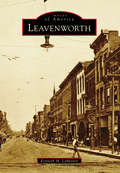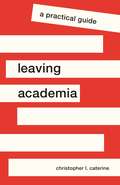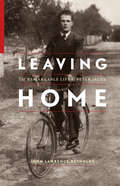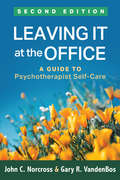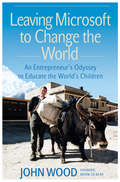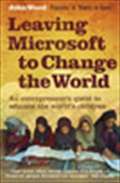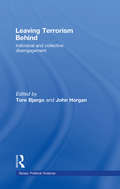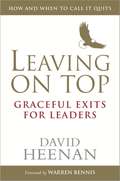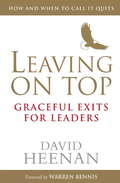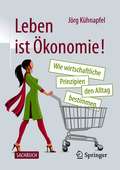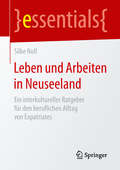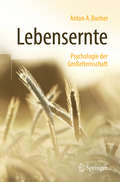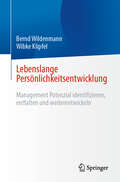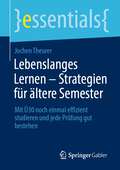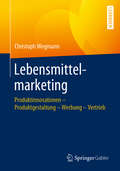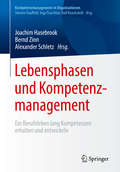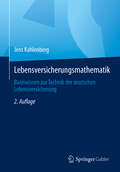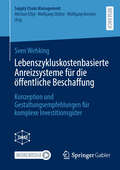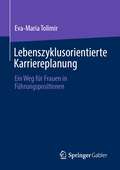- Table View
- List View
Leave Your Mark: Land your dream job. Kill it in your career. Rock social media.
by Aliza LichtLEAVE YOUR MARK isn't an advice book -- it's a mentorship in 288 pages. Aliza Licht -- global fashion communications executive, AKA fashion's favorite 'PR girl' and Twitter phenomenon -- is here to tell her story, complete with The Devil Wears Prada-like moments and insider secrets.Drawing invaluable lessons from her experience, Licht shares advice, inspiration, and a healthy dose of real talk in LEAVE YOUR MARK. She delivers personal and professional guidance for people just starting their careers and for people who are well on their way. With a particular emphasis on communicating and building your personal brand, something she knows a thing or two about, Aliza is your sassy, knowledgeable guide to the contemporary working world, where personal and professional lines are blurred and the most important thing you can have is a strong sense of self.
Leave Your Phone at the Door: The Joy of OFFLINE
by Howard LewisLeave Your Phone at the Door acts as a timely and topical reminder to look beyond our phones and enjoy the physical benefits of community, randomness and serendipity.Real life happens beyond your phone screen. Leave Your Phone at the Door embraces the OFFLINE philosophy, which is a celebration of the much underrated virtues of randomness and serendipity. Whether sharing stories of unexpected encounters, alarming behavioral trends or the joys of quiet and contemplation, Howard Lewis encourages us to adopt an open mind and a generosity of spirit whenever we are confronted by the unfamiliar or surprising or different. We all have an innate desire to communicate but our constant reliance today upon personal technology is stripping our sensibilities bare. But rather than focusing upon the limitations of social media and phones, Lewis is far more animated by the mindful reframing of our place in the world. He offers his insights on the importance of relating to people in person and advice on developing social skills and habits that enrich our lives. What began as an informal gathering with friends led to the launch of the OFFLINE dinner, which he has hosted for over fifteen years in London. Guests are drawn from all walks of life and invited to engage with one another without the distraction of their phones. OFFLINE is designed to be the antithesis of everything online but also recognizes that veering off road and then back on it is both valuable and necessary. It aims to challenge and provoke, question and answer, stimulate and amuse, nurture and nourish in a delightful and congenial setting. This book is an embodiment of that ethos. Leave Your Phone at the Door acts as a timely and topical reminder to look beyond our phones and enjoy the physical benefits of community, randomness and serendipity. Who knows where it may take you and whom you might meet?!
Leave the Office Earlier: The Productivity Pro Shows You How to Do More in Less Time...and Feel Great About It
by Laura StackLong hours. Juggling family and work. Deadlines. High stress levels. Today’s professionals are feeling more overworked and overwhelmed than ever before. Yet you CAN get more done than you ever thought possible—and still get home to your real life sooner. Laura Stack, “The Productivity Pro,”® shows you how.Leave the Office Earlier explores the ten key factors that improve results, lower stress, and save time in today’s workplace. Fun, interactive quizzes speed you to exactly the advice and techniques you need the most. You can tailor this information-loaded book to your own needs by focusing on your problem areas—such as time-wasters, distractions, email overload, or poor organization—and by following the easy-to-implement solutions. With Laura Stack’s help, you’ll work more efficiently and be more productive in every area of your life, so that you can really live according to your priorities. Don’t just work faster. Work better, reduce stress, and leave the office earlier!www.broadwaybooks.com
Leavenworth
by Kenneth M. LamasterOn May 30, 1854, Pres. Franklin Pierce signed the hotly contested Kansas-Nebraska Act. Before the ink was dry, squatters settled on the 322-acre plot of land bounded by the Fort Leavenworth Military Reservation (to the north) and Three Mile Creek (to the south). From Bleeding Kansas to western expansion, many historical figures have called Leavenworth home, including Fred Harvey, Buffalo Bill Cody, and Wild Bill Hickok, to name but a few. The landscape is decorated with buildings and homes featuring a beauty and grandeur that have stood the test of time. Originally known as the �Queen City of the West,� this metropolis would become one of the largest manufacturing cities in America, providing goods and services to markets all over the world. Historical churches, the Leavenworth VA Medical Center, the Sisters of Charity of Leavenworth, and Leavenworth National Cemetery all contribute to the town�s pioneering spirit that is second to none.
Leaving Academia: A Practical Guide (Skills for Scholars)
by Christopher L. CaterineAn indispensable guide for grad students and academics who want to find fulfilling careers outside higher educationAn estimated ninety-three percent of graduate students in the humanities and social sciences won’t get a tenure-track job, yet many still assume that a tenured professorship is the only successful outcome for a PhD. With the academic job market in such crisis, Leaving Academia helps grad students and academics in any scholarly field find satisfying careers beyond higher education. Short and pragmatic, the book offers invaluable advice to visiting and adjunct instructors ready to seek new opportunities, to scholars caught in “tenure-trap” jobs, to grad students interested in nonacademic work, and to committed academics who want to support their students and contingent colleagues more effectively.After earning a PhD in classics from the University of Virginia and teaching at Tulane, Christopher Caterine left academia for a job at a corporate consulting firm. During his career transition, he went on more than 150 informational interviews and later interviewed twelve other professionals who had left higher education for diverse fields. Drawing on everything he learned, Caterine helps readers chart their own course to a rewarding new career. He addresses dozens of key issues, including overcoming psychological difficulties, translating academic experience for nonacademics, and meeting the challenges of a first job in a new field.Providing clear, concrete ways to move forward at each stage of your career change, even when the going gets tough, Leaving Academia is both realistic and filled with hope.
Leaving Home
by John Lawrence ReynoldsPetro (Peter) Jacyk survived two of the most horrendous events of the 20th century: the Ukrainian famine of the 1930s, instigated by Stalin and responsible for the deaths of untold millions, and waves of invasion and slaughter from Soviet Russia and Nazi Germany. Fleeing postwar Europe in 1949, he arrived in Canada with seven dollars in his pocket and horrific images in his memory. His adopted country would inspire a deep and lifelong love in Jacyk. Here at last, as he put it, he was "free to live and free to succeed." Through the Toronto building and land development firm he founded, he established himself as an economic and cultural powerhouse. Exacting in his dealings with others, yet a generous mentor, he sought excellence in all of his pursuits. In time, the man who had begun as a "poor-penny immigrant" became one of the country's most prominent philanthropists, donating substantial portions of his wealth to projects dedicated to Ukrainian history, language, and culture. Universities such as Harvard, Columbia, and the University of Toronto benefited from his largesse. Leaving Home celebrates the life of a remarkable man determined to make a positive impact on an often-hostile world.
Leaving It at the Office, Second Edition: A Guide to Psychotherapist Self-Care
by John C. Norcross Gary R. VandenBosMental health professionals provide better care to their clients when they care for themselves. This highly practical guide--now revised and expanded with even more self-care strategies--has helped thousands of busy psychotherapists balance their personal and professional lives. The book presents 13 research-informed self-care strategies and offers concrete methods for integrating them into daily life. Featuring examples and insights from master therapists, every chapter concludes with a self-care checklist. Infused with a positive message of self-renewal and growth, the book shows clinicians how to leave distress at the office and tend actively to their physical, emotional, and spiritual needs. New to This Edition *Chapter on mindfulness and self-compassion. *Increased emphasis on simple, real-time self-care activities. *New examples from additional master therapists and hundreds of workshop participants. *Up-to-date research findings on therapist stress and resilience. *Discussions of competence constellations, building on self-care strengths, moral stress, deliberate practice, presession preparation, journaling, and multiculturalism.
Leaving Microsoft to Change the World
by John WoodJohn Wood discovered his passion, his greatest success, and his life's work not at business school or helping lead Microsoft's charge into Asia in the 1990s but on a soul-searching trip to the Himalayas. He made the difficult decision to walk away from his lucrative career to create Room to Read, a nonprofit organization that promotes education across the developing world. By the end of 2007, the organization will have established over 5,000 libraries and 400 schools, and awarded long-term scholarships to more than 3,000 girls, giving more than one million children the lifelong gift of education. If you have ever pondered abandoning your desk job for an adventure and an opportunity to give back, Wood's story will inspire you. He offers a vivid, emotional, and absorbing tale of how to take the lessons learned at a hard-charging company like Microsoft and apply them to the world's most pressing social problems.
Leaving Microsoft to Change the World
by John WoodJohn Wood discovered his passion, his greatest success, and his life's work not at business school or helping lead Microsoft's charge into Asia in the 1990s but on a soul-searching trip to the Himalayas. He made the difficult decision to walk away from his lucrative career to create Room to Read, a nonprofit organization that promotes education across the developing world. By the end of 2007, the organization will have established over 5,000 libraries and 400 schools, and awarded long-term scholarships to more than 3,000 girls, giving more than one million children the lifelong gift of education. If you have ever pondered abandoning your desk job for an adventure and an opportunity to give back, Wood's story will inspire you. He offers a vivid, emotional, and absorbing tale of how to take the lessons learned at a hard-charging company like Microsoft and apply them to the world's most pressing social problems.
Leaving Microsoft to Change the World: An Entrepeneur's Odyssey to Educate the World's Children
by John E. WoodsA trip to Nepal convinced Wood to divert the energy he was devoting to Microsoft into a cause that needed addressing - educating all children
Leaving Terrorism Behind: Individual and Collective Disengagement (Political Violence)
by John Horgan Tore BjorgoThis new edited volume expands our understanding of the processes by which individuals and groups disengage from terrorism. While there has been a growing awareness of the need to understand and prevent processes of radicalization into terrorism, disengagement and deradicalization from terrorism have long been neglected areas in research on terrorism. This book uses empirical data to explore how and why individuals and groups disengage from terrorism, and what can be done to facilitate it. The work also presents a series of case studies of disengagement programmes, from Colombia, northern Europe, Italy, Yemen, Saudi Arabia, Indonesia, Singapore and Malaysia, comparing and assessing their various strengths and weaknesses. In light of the lessons learned from these cases, this book describes and explains the potential for new developments in counter-terrorism. This book will be of great interest to all students of terrorism studies, war and conflict studies, international security and politics in general, as well as professionals in the field of counter-terrorism.
Leaving on Top: Graceful Exits For Leaders
by David HeenanLeaving on Top: Graceful Exits for Leaders explores what it means to move on from a career with a class and a view for what's next. While most graceful exiters pursue a variety of interests throughout their professional lifetime, others are content to reach the top and then cling to it. Through this research, David Heenan has found that most leaders can be categorized into four exiting types: Timeless wonders: With their skills very much intact, these white-haired prodigies have no need to call it quits. Aging Despots: Reluctant to leave the spotlight, they are past their prime and should turn the reigns over to a new generation. Comeback Kids: Whether to return their enterprises to their former glory, or simply save themselves from boredom, these once-departed leaders have returned with a vengeance. Graceful Exiters: Quitting while ahead, they leave a sterling reputation as they move on. Heenan understands how to exit gracefully from his profession-he's done it several times. In Leaving On Top, he pairs wisdom derived from his experience with dozens of high-profile exits, both graceful and untimely. Heenan's examination includes ten exiting lessons from leaders of industry, such as: Know Thy Situation: Situations change, and the intuitive know when a great career has fizzled. Take Risks: Accept change as a natural part of your transition, push your comfort zone to confront new challenges. Keep Good Company: Build alliances to help plan your exit strategy, then stay connected. Keep Learning: Graceful exiters remain curious. They are intellectually interested, alert, and adaptable. Know When to Walk Away: Blind determination often backfires. Don't let professional success cloud your personal life.
Leaving on Top: Graceful Exits for Leaders
by David HeenanLeaving on Top: Graceful Exits for Leaders explores what it means to move on from a career with a class and a view for what's next. While most graceful exiters pursue a variety of interests throughout their professional lifetime, others are content to reach the top and then cling to it. Through this research, David Heenan has found that most leaders can be categorized into four exiting types: Timeless wonders: With their skills very much intact, these white-haired prodigies have no need to call it quits. Aging Despots: Reluctant to leave the spotlight, they are past their prime and should turn the reigns over to a new generation. Comeback Kids: Whether to return their enterprises to their former glory, or simply save themselves from boredom, these once-departed leaders have returned with a vengeance. Graceful Exiters: Quitting while ahead, they leave a sterling reputation as they move on. Heenan understands how to exit gracefully from his profession - he's done it several times. In Leaving On Top, he pairs wisdom derived from his experience with dozens of high-profile exits, both graceful and untimely. Heenan's examination includes ten exiting lessons from leaders of industry, such as: Know Thy Situation: Situations change, and the intuitive know when a great career has fizzled. Take Risks: Accept change as a natural part of your transition, push your comfort zone to confront new challenges. Keep Good Company: Build alliances to help plan your exit strategy, then stay connected. Keep Learning: Graceful exiters remain curious. They are intellectually interested, alert, and adaptable.Know When to Walk Away: Blind determination often backfires. Don't let professional success cloud your personal life.
Lebanon: Statistical Appendix
by International Monetary FundA report from the International Monetary Fund.
Leben ist Ökonomie!: Wie wirtschaftliche Prinzipien den Alltag bestimmen
by Jörg Kühnapfel„Immer dreht sich alles nur ums Geld!“ Ökonomie wird gemeinhin als Gegenpol zu Emotionen begriffen, als eine Welt voller Zwänge und Notwendigkeiten. Der Begriff "Ökonomie" ist weithin negativ konnotiert und gilt als unsympathisch; er hat zweifellos ein Imageproblem. Doch das gesamte Lebensumfeld ist ein ökonomisch determiniertes System im Sinne von Chancen und Risiken, Einsatz und Ergebnis. Dieses Buch vermittelt beispielhaft anhand typischer Momente im Tagesverlauf der Protagonistin Julia die Erkenntnis, dass sich jeder Mensch unentwegt in einem Universum ökonomischer Modelle bewegt und mithilfe wirtschaftlicher Erwägungen seine Alltags- und Lebensentscheidungen deutlich verbessern kann - zu eigenen wie zu anderer Gunsten.
Leben und Arbeiten in Neuseeland: Ein interkultureller Ratgeber für den beruflichen Alltag von Expatriates (essentials)
by Silke NollDieses essential beschreibt Schritt für Schritt Jobsuche, Berufseinstieg, beruflichen Alltag und angrenzende Privatbereiche in Neuseeland und damit verbundene potenzielle Stolpersteine bei der interkulturellen Kommunikation. Das Buch geht sowohl auf oberflächlich Offensichtliches ein, als auch auf subtilere Wahrnehmungen, die durch die interkulturelle Theorie erklärt werden. Der Leser erhält auf diese Weise ein tieferes Verständnis der neuseeländischen Kultur mit ihren Werten und ungeschriebenen Regeln und Gesetzen. Und damit eine Chance, den Einstieg in dem Land am anderen Ende der Welt noch erfolgreicher zu gestalten.
Lebensernte: Psychologie der Großelternschaft
by Anton A. BucherIn diesem Buch können sich alle, die in ihre Enkel vernarrt sind, informieren, warum sie damit sehr richtig liegen. Ein Streifzug durch Geschichte und Literatur wird fundiert durch Aspekte der Familienforschung und die soziologische Betrachtung einer neuen Rolle der Großeltern. Heute haben Großeltern nicht mehr nur eine Funktion für die Kleinen, sondern begleiten über die Lebensspanne. In einer Zeit, in der man den Eindruck bekommt, jeder Zweite würde das Alter als Last empfinden oder jeder Vierte lebe in Zwist und Trennung, lädt der Autor ein, die Etappe als Oma und Opa als Ressource für ein gelungenes Leben zwischen Individuation und Bezogenheit zu entdecken – für sich selbst wie für die Enkel. Die Sicht der Enkel rundet das Lesebuch ab. Aus dem Inhalt: Großeltern in Literatur und Geschichte – Nicht nur Märchen erzählen, sondern joggen gehen – Ernte der Beziehung – Die Sicht der Enkel. Über den Autor: Prof. Dr. Anton A. Bucher widmet sich neben seinen universitären Studien gern psychologischen Aspekten des guten Lebens und ist Autor mehrerer erfolgreicher Bücher.
Lebenslange Persönlichkeitsentwicklung: Management Potenzial identifizieren, entfalten und weiterentwickeln
by Bernd Wildenmann Wibke KlipfelDieses Buch unterstützt Sie dabei, den eigenen Stand der Persönlichkeitsreifung zu ermitteln und weiterzuentwickeln. Dies wird Ihnen auch in der Führung und Begleitung anderer Menschen weiterhelfen. Aus der Erkenntnis der lebenslangen Entwicklung der Persönlichkeit, ergeben sich im Laufe des Lebens in den verschiedenen Reifungsstufen viele Möglichkeiten der Entfaltung. Das Buch zeigt auf, dass zwar nicht alles zu jedem Zeitpunkt, aber zu jedem Zeitpunkt etwas entwickelbar ist. Anhand eines leicht verständlich dargestellten Modells erfahren Sie, welche Reifestufen wir Menschen erreichen können und welche persönlichen Entwicklungen über das Leben hinweg möglich sind. Dabei wird das übliche horizontale Einschätzungsverfahren mit Kompetenzen, Haltungen, Motiven und Emotionen durch eine vertikale, neue und spannende Perspektive ergänzt. Sie erhalten Entwicklungstipps für die unterschiedlichen Entwicklungsstufen und Entwicklungsfelder. Die Autoren vermitteln dabei positive Entwicklungsmöglichkeiten in nahezu allen Feldern und regen damit einen Paradigmenwechsel der Persönlichkeitsbetrachtung an.
Lebenslanges Lernen – Strategien für ältere Semester: Mit Ü30 noch einmal effizient studieren und jede Prüfung gut bestehen (essentials)
by Jochen TheurerLebenslanges Lernen wird immer wichtiger. Doch mit über 30 Jahren nochmal zurück an die Uni? In diesem essential zeigt Jochen Theurer am eigenen Beispiel, wie man im fortgeschrittenen Lebensalter auch mit familiären und beruflichen Bindungen erfolgreich und gelassen ein zweites Mal studiert. Denn dafür ist es nie zu spät. Und mit Ü30 verfügen Sie über Ressourcen, von denen mancher frischgebackene Abiturient nur träumen kann.
Lebensmittelmarketing: Produktinnovationen – Produktgestaltung – Werbung – Vertrieb
by Christoph WegmannLernen Sie mit diesem Buch das Lebensmittelmarketing kennenMarketing für Lebensmittel ist ein besonderes Feld. Schließlich ist die Auswahl, vor der Konsumenten stehen, riesig. Zudem müssen Lebensmittelproduzenten die individuellen Bedürfnisse der Verbraucher befriedigen, um am Ende Gewinne zu erzielen. Doch wie schaffen es Firmen, dass sich Konsumenten im großen Angebotsdschungel letztendlich gezielt für ein Produkt entscheiden? Dieses Buch liefert die Antwort und gibt überraschende Einblicke in die Lebensmittelindustrie. Christoph Wegmann zeigt auf, wo die Unterschiede bei der Vermarktung von Lebensmitteln im Vergleich zu anderen Konsumgütern liegen. Er erläutert, worauf Sie im Bereich des Food Marketings achten müssen. Zudem adressiert er in diesem Buch die Herausforderungen, die sich im Rahmen des Lebensmittelmarketings stellen. Er erörtert Lösungsmöglichkeiten und geht außerdem auf ethische Fragestellungen ein, mit denen sich die Branche auseinandersetzen muss. Lesenswert für Studenten und Praktiker Durch seinen thematischen Schwerpunkt richtet sich Christoph Wegmanns Buch „Lebensmittelmarketing“ speziell an folgende Zielgruppen:Studierende aus den Bereichen Ökotrophologie, Ernährungswissenschaftten oder BWLPraktiker, die im Bereich der Lebensmittelvermarktung arbeiten oder in diese Branche wechselnMitarbeiter, die in Schnittstellenbereichen des Lebensmittelmarketings beschäftigt sindSo erhalten Sie als Leser mit diesem Werk eine klare Übersicht über die verschiedenen Aspekte und die damit verbundenen Handlungsmöglichkeiten im Rahmen der Lebensmittelwerbung und Produktpositionierung.Lesen Sie mehr über Vertrieb und ProduktgestaltungInhaltlich legt der Autor mit diesem Buch den Fokus auf Bereiche, in denen das Lebensmittelmarketing mit speziellen Rahmenbedingungen konfrontiert ist. Daher stehen zunächst Grundlagen für ein besseres Marktverständnis im Fokus. In den folgenden Kapiteln geht es u. a. um diese Kernbereiche:ProduktinnovationenProduktgestaltung (z. B. Lebensmittelverpackung)Werbung für LebensmittelMögliche VertriebswegeAbschließend beleuchtet dieses Buch die ethischen Herausforderungen und den optimalen Umgang mit ihnen im Lebensmittelmarketing. Ein hilfreicher Begleiter in Sachen Werbung und Vertrieb in der Lebensmittelbranche.
Lebensphasen und Kompetenzmanagement
by Joachim Hasebrook Bernd Zinn Alexander SchletzKompetenzen älterer Mitarbeiterinnen und Mitarbeiter werden im Betrieb gehalten, jüngere Mitarbeiter profitieren von den Erfahrungen älterer, Familiengründung, finanzielle Absicherung und berufliche Karriere werden für beide Elternteile unter einen Hut gebracht: Dies alles und mehr sind Aufgaben einer an Lebensphasen und -ereignissen ausgerichteten Kompetenzentwicklung, um die es in diesem Band gehen soll. Dieses Buch vermittelt fundiert und praxisnah, wie sich organisationales Kompetenzmanagement in Zeiten des demografischen Wandels an Lebensphasen und -ereignissen orientieren kann.
Lebensversicherungsmathematik: Basiswissen zur Technik der deutschen Lebensversicherung
by Jens KahlenbergDieses Buch gibt eine ausführliche und verständliche Einführung in die Technik der deutschen Lebensversicherung. Nach einer allgemeinen Einleitung werden die Rechnungsgrundlagen Zins, Biometrie und Kosten, die Berechnung von Prämien, Leistungen und Reserven sowie die Überschussbeteiligung erläutert. Über diese klassische Lebensversicherungsmathematik hinaus geht der Autor detailliert auf die Darstellung fondsgebundener Tarife ein und beschreibt auch das komplexe Teilgebiet der Berufsunfähigkeitsversicherung in aller Tiefe. Zudem werden Aspekte der Pflegeversicherung sowie Fragestellungen des Jahresabschlusses und der Bilanzierung behandelt. Zahlreiche Übungsaufgaben inklusive Lösungen unterstützen das Selbststudium und veranschaulichen die versicherungstechnischen Vorgehensweisen. Ein umfassender Anhang mit biometrischen Rechnungsgrundlagen, mathematischen Grundformeln, Wörterbuch und Symbolverzeichnis rundet das Werk ab.
Lebensziel: Mehr Gesundheit, Energie und Lebensfreude
by Maik GöbbelsViele fundierte Impulse für Ihr persönliches Glück – trainieren Sie Ihre Körperchemie auf gute Energie! Der erfahrene Sport- und Mentaltrainer Maik Göbbels erklärt, welche individuellen Anreize aus Ernährung, Bewegung und sozialem Umfeld das persönliche Muster eines Menschen für Gesundheit, Zufriedenheit und Erfolg triggern. Verständnisvoll und motivierend erhält der Leser konkrete Hinweise auf den eigenen Status quo und erfährt, wie er dank der Kraftwerke im eigenen Körper, der Mitochondrien, neue Energien gewinnt, die eigene Kraft (wieder) fokussiert, lohnende Änderungen wagt, Resilienz aufbaut und vor allem seine volle Lebensfreude wiederfindet.
Lebenszykluskostenbasierte Anreizsysteme für die öffentliche Beschaffung: Konzeption und Gestaltungsempfehlungen für komplexe Investitionsgüter (Supply Chain Management)
by Sven WehkingDie öffentliche Beschaffung umfasst allein in Deutschland rund 350 Mrd. € mit steigender Tendenz. Grund genug, sich mit innovativen Konzepten zu beschäftigen, um die öffentliche Beschaffung möglichst effizient und effektiv zu gestalten. Lebenszykluskosten und Lebenszykluskostenmanagement sind bereits seit langer Zeit Gegenstand der wissenschaftlichen Forschung. Mit der Novellierung des öffentlichen Vergaberechts im Jahr 2016 werden Lebenszykluskosten erstmals explizit als Zuschlagskriterium genannt, womit dem Anspruch an eine ökonomische Nachhaltigkeit der öffentlichen Beschaffung Rechnung getragen wird. Aufgrund von Fehlanreizen für Auftragnehmer bedarf es jedoch Anreizsysteme, um die kontrahierten Lebenszykluskosten auch einzuhalten. Darauf aufbauend soll mit dem in diesem Buch vorgelegten Konzept ein Versuch unternommen werden, diese Herausforderung anzugehen.
Lebenszyklusorientierte Karriereplanung: Ein Weg für Frauen in Führungspositionen
by Eva-Maria TolimirDas vorliegende Werk stellt eine empirische Untersuchung zu den Voraussetzungen, Wirkungspotenzialen und Umsetzungshindernissen der Gestaltung von weiblichen Führungskarrieren dar, die sich an Lebenszyklen orientiert und sich als Beitrag zur geschlechterorientierten Karriereforschung versteht. Das Thema wird vorwiegend aus soziologischer und psychologischer Perspektive behandelt, wobei aber auch stark praktische und disziplinübergreifende Erfahrungen berücksichtigt werden. Aus ökonomischer Sicht geht es bei der Repräsentanz von Frauen in Führungspositionen um Fairness und Effizienz, etwa bei der zunehmend schwieriger werdenden Rekrutierung von Fach- und Führungskräften, also um ausgesprochen aktuelle Fragestellungen. Erforderliche organisationale Rahmenbedingungen sowie Theorien zu Bedürfnissen, Motivatoren für Karrieren und Nutzenerwägungen werden in Beziehung gesetzt zum tatsächlichen Stand weiblicher Führungskräfte in Deutschland. Die Erkenntnisse aus Interviews mit weiblichen und männlichen Führungskräften zu deren Karriereentwicklung bringen zusätzliche Erkenntnisse und stellen die Forschungselemente des Werkes dar.



